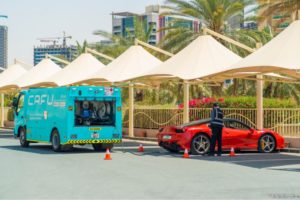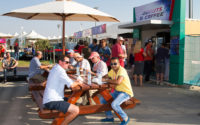The Final Stretch: Let’s Do Our Bit To Stay #Roadsafetogether And Accident-Free This Ramadan, As We Head Into A Long Eid Weekend
We are officially in the final stretch of the holy month of Ramadan – a pious month of fasting, community and giving. But it is also a time where we see an increase in the number of accidents on the road – particularly during the ‘pre-iftar’ rush hours, as everyone is eager to get home in time to pray and break their fast.
As we enter the final week of this holy month and get ready for a long weekend for Eid, CAFU and RoadSafetyUAE are urging residents to be #RoadSafeTogether, by doing their bit to keep our roads safe so we can all enjoy an accident-free celebration over Eid.
To do this, they have put together a simple four-point Ramadan Road Safety tips-list to follow:
- Care:
Yes, this may seem like a rather unusual and dare we say odd tip, but it is perhaps the most important one. When you are mindful of the people in your life who care for you and for your safety, you would automatically prioritise safe driving over anything – be it getting some place in time, or simply trying to be more patient.
Once we do that, we automatically become road safety champions by avoiding speeding, cutting lanes, or any other reckless behaviour on the roads – guaranteed.
- Don’t risk it:
We’re all human. And fasting long hours with no food and water, and not enough sleep can definitely take its toll on our bodies. We are less likely to be as alert, and chances of feeling drowsy and perhaps even weak, especially when doing an activity like driving can be quite high. But at the same time, being alert when driving is an unequivocal must; so, if you feel sleepy, drowsy, or weak and don’t feel like you’re up to drive, then simply, don’t risk it. Arrange for alternative transportation, or should you feel drowsy while driving, pull over in a safe place and either wait till you feel better or ask a friend or family member to come get you.
- Plan and anticipate:
This month comes around every year, which means that we should have a better understanding of what works best for us, our bodies, and when driving on the roads. Rush hour in the mornings and during iftar – plan around it. Make necessary arrangements to leave at a time that works for you so that you aren’t rushing, be it leaving the house or office earlier, working from home, or being prepared to break your fast wherever you are.
You know people tend to rush and make risky movements on the road – anticipate this and be extra safe and cautious while driving.
And it’s not too late to try and be safer. We are more than halfway through the holy month, which means there’s still time to make the necessary arrangements to help our final stretch before Eid be smooth and accident free.
- Fix it:
While this holds true anytime of the year, the last thing you need during rush hour ahead of Iftar, or prior to a fun Eid getaway, is to have a tyre that seems to be giving way, a broken side mirror, or your car stopping in the middle of the road because of an unusual sound or anomaly you put off getting checked. So, rule of thumb, if you notice something’s off, don’t wait. Fix it. Now!










